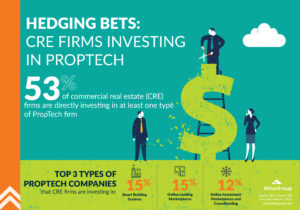 Altus Group Limited (“Altus Group”) (TSX: AIF), a leading provider of software, data solutions and independent advisory services to the global commercial real estate industry, recently released the latest Altus Group CRE Innovation Report. The report provides an outlook on technology trends impacting the global CRE industry and highlights the significant acceleration in adoption of property technology (“PropTech”), the effect of disintermediating technologies, as well as a growing trend of CRE firms investing directly in PropTech companies and startups themselves.
Altus Group Limited (“Altus Group”) (TSX: AIF), a leading provider of software, data solutions and independent advisory services to the global commercial real estate industry, recently released the latest Altus Group CRE Innovation Report. The report provides an outlook on technology trends impacting the global CRE industry and highlights the significant acceleration in adoption of property technology (“PropTech”), the effect of disintermediating technologies, as well as a growing trend of CRE firms investing directly in PropTech companies and startups themselves.
According to the report, based on a global survey of 400 property owners with assets under management representing a total of over US $2 trillion, the industry is at a turning point in embracing technology and has entered a state of experimentation, adoption and investment as new technologies and applications continue to emerge. Driving efficiency through automation is a key priority for CRE executives, and the use of AI and machine learning is approaching a critical mass.
Similarly, transaction-based platforms such as online property exchanges, lending marketplaces and crowdfunding are now increasingly being used to streamline processes and create a more direct line between buyers and sellers, lenders and owners, and investors and funds, effectively altering the relationships between them at a fundamental level.
This is no doubt a turning point for the industry and is a high priority to not only the 400 global CRE executives interviewed for the survey (with assets under management representing a total of over US $2 trillion), but the commercial real estate industry at-large.
When asked, the survey of 400 property owners found that:
- 82% of U.S. executives (the highest globally) say sharing economy firms such as Airbnb are influencing their investment/portfolio decisions
- 69% of U.S. executives say the rise Co-Working (e.g. WeWork) is influencing their investment/portfolio decisions
- 58% of U.S. executives say e-commerce firms such as Amazon are influencing their investment/portfolio decisions
Driving efficiency through automation, AI and machine learning is becoming increasingly more important and is approaching a critical mass. In fact:
- 41% of firms are using automation for benchmarking and performance analysis, 39% for scenario and sensitivity analysis and 36% for budgeting and forecasting
- 19% of firms are using AI and machine learning for scenario and sensitivity analysis, followed by 16% for accounting and property management.
An overview of the entire report can be found here.









